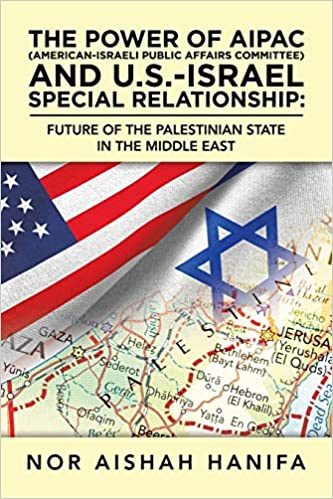The Power of AIPAC (American-Israel Public Affairs Committee) and U.S.-Israel Special Relationship: Future of the Palestinian State in the Middle East by Nor Aishah Hanifa
$ 18.00
The Israeli-Palestinian conflict is a multi-dimensional conflict with numerous forces working collectively from international structure, regional structure and domestic structure. This book aims to offer a comprehensive reading on the AIPAC, the U.S. Middle East Policy, Israel, structural fault lines, and creation of the Palestinian state. The book touches on specific aspects, such as; - The macro dimension of the Israeli-Palestinian conflict. - U.S.-Israel Special Relationship (1948-2019). - The American Jewry. - The AIPAC and its modus operandi in U.S. - The U.S. Middle East Policy. - Future of the Palestinian State in the Middle East. AIPAC is the strongest American-Jewish lobby in the United States. Many critics argue that AIPAC able to influence the U.S. Middle East policy, thus jeopardizes the U.S. national interest. For many decades, intangible factor, the soft power of American Jewry has been serving the national interest of Israel. American domestic structure is embedded within liberal democratic values, enable the American Jewish lobbies to operate successfully. This phenomena attracted attention of many scholars, such as; Samuel P. Huntington and George F. Kennan, Tony Smith, David Truman, John J. Mearsheimer, and Stephen M. Walt to produce valuable literatures. John J. Mearsheimer and Stephen M. Walt assert that the AIPAC is dangerous to U.S. national interest. AIPAC plays an important role in preserving the U.S.-Israel "special relationship" in the American soil through lobbying strategy. A triangular pattern of relationships prevail between AIPAC, Israel and the U.S. Middle East policy. AIPAC serves to preserve the "special relationship" between Israel and U.S. in periods of peace and turmoil. Some critics say AIPAC projects dual nationalism in their modus operandi. AIPAC represents the loyal American Jews who wish to see the United States of America remains strong and powerful in international system. At the same time, AIPAC loves and supports Israel as the Jewish national home. AIPAC aims to see Israel secured and able to survive in the volatile Middle East region. Apparently AIPAC has certain level of influence over the US Middle East policy in creation of the Palestinian state. AIPAC ensures creation of the Palestinian state is safe to Israel's national interest and national security. AIPAC often tries to direct the U.S. Middle East policy towards other contagious issues in the region to divert U.S. attention in the Palestinian peace process. Success and failure in AIPAC's lobby depend on U.S. national interest in the region. AIPAC never possess insurmountable power to influence the US Middle East policy. AIPAC able to influence the U.S. Middle East policy when there is a convergence factor with the U.S. national interest. The prime force in the U.S. Middle East policy is undoubtedly the U.S. national interest. Followed by Israel's security, security and stability of the Middle East. However, AIPAC as an instrument of policy should not be excluded from the study on the Palestinian state.
Year: 2020






Share this item: